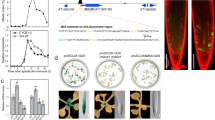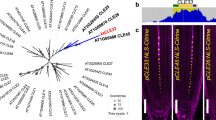Abstract
We present evidence to show that the KEULE gene of Arabidopsis is involved in cytokinesis. Mutant keule embryos have large multinucleate cells with gapped or incomplete cross walls, as well as cell wall stubs that are very similar to those observed upon caffeine inhibition of cytokinesis in plants. These defects are observed in all populations of dividing cells in the mutant, including calli, but less frequently in mature cells. Cell division appears to be slowed down, and the planes of cell division are often misoriented. In late embryos and seedlings, cross-wall formation usually appears complete, suggesting that the requirement for KEULE during cytokinesis is not absolute. Nonetheless, keule mutants die as seedlings with large polyploid cells. The bloated surface layer of keule seedlings does not uniformly behave like wild-type epidermis, and patches of this layer assume characteristics of the underlying ground tissue. The cytokinesis defect of keule mutants may influence aspects of cellular differentiation.
Similar content being viewed by others
Author information
Authors and Affiliations
Additional information
Received: 24 April 1996 / Accepted: 11 June 1996
Rights and permissions
About this article
Cite this article
Assaad, F., Mayer, U., Wanner, G. et al. The KEULE gene is involved in cytokinesis in Arabidopsis . Mol Gen Genet 253, 267–277 (1996). https://doi.org/10.1007/PL00008594
Issue Date:
DOI: https://doi.org/10.1007/PL00008594




